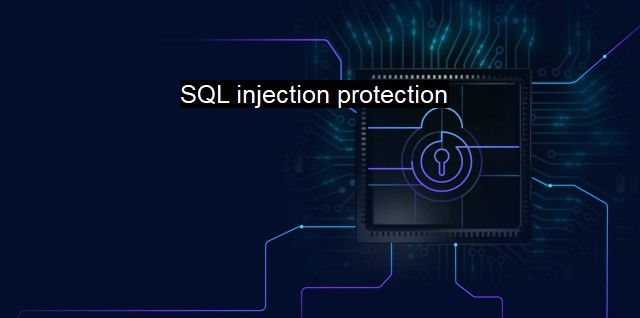What is SQL injection protection?
Understanding SQL Injection Attacks: Protection Measures and Implications for Cybersecurity
SQL injection protection is a crucial aspect of cybersecurity that defends systems against SQL injection attacks, one of the most commonly exploited vulnerabilities in the field of web application security. This form of attack involves the insertion of malicious SQL code into a query via client to server data submission channels like form inputs and cookies. The server, mistaking the code for legitimate instructions, executes it, allowing the intruder to manipulate the database, steal or alter the data, or even execute administrative operations. It's a serious security risk given the extensive amount of sensitive information stored in databases, such as personal contact details, confidential business information, or access credentials.SQL injection protection aims to safeguard databases from such attacks with a focus on two areas: preventing unauthorized access to the server’s database and maintaining the integrity of website functionality. It is of paramount importance because once an attacker gains access to an organization's database, they can manipulate or extract data, leading to data breaches, system failures, or unexpected behaviour of the database system. In extensive scenarios, loss of control over the server itself can occur, resulting in grave consequences for the affected organization.
The first line of protection comes from properly validating, sanitizing, and prepared statements - a form of dynamic SQL query used to ensure that a server only runs approved statements. User inputs are the primary vehicle for injection attacks; therefore, data from these sources needs to go through rigorous vetting. Validation ensures that an input meets defined criteria in terms of type, format, and length. Sanitization further cleanses the inputs from potential SQL code. By escaping certain characters within the input through encoding, the code is effectively neutralized since the server interprets it as data and not executable SQL. On the same lane, use of prepared statements prevents SQL injection by separating the data being sent from the code being executed, eliminating the ability of an attacker to inject malicious code.
(Column names should never come from user inputs because they cannot be parameterized. Whenever column names or other non-parameterizable user-dependent values need to influence the SQL statement, whitelist maps can be used to match user inputs to hard-coded column names or values.)
LDAP injection and code injection are vulnerabilities related to SQL injection, against which protection must be calibrated. Secure coding practices can help minimize these threats, while intrusion detection and prevention systems (IDS/IPS) can monitor a system for any signs of such attacks. Regular security audits, testing, vulnerability assessments, network segmentation, and implementing the latest patches are also critical prevention strategies.
In addition to technical methods, the human angle of protection involves robust staff training measures to educate personnel on secure coding practices and on how to detect and respond to potential SQL injection attempts. It is equally important to raise awareness of the importance of consistent password updates and adhere to authorization and authentication rules to secure the access points to the organization's databases.
In the antivirus context, SQL injection protection refers to the prevention mechanisms an antivirus software might employ to stave off SQL injection attacks. Some antivirus platforms have advanced features that not only detect and eliminate malware but also analyze behavior to identify suspicious processes. They neutralize potential SQL attacks by identifying and blocking malicious SQL codes based on patterns, regular expressions or specific risk identifiers, thereby protecting the corporate database.
While SQL injection attacks pose a significant threat to cybersecurity, SQL injection protection serves as a comprehensive barricade to these threats. It plays a key role in securing the data of companies and individuals alike, involving rigorous sanitization and validation, secure coding practices, and continuous system vigilance through auditing and monitoring. Cybersecurity training along with advanced antivirus measures strengthens the overall system against such threats.

SQL injection protection FAQs
What is SQL injection protection?
SQL injection protection refers to the measures put in place to prevent cybercriminals from exploiting an SQL injection vulnerability in a database.Why is SQL injection protection important in cybersecurity?
SQL injection is among the most common techniques used by cybercriminals to gain unauthorized access to databases. SQL injection protection is essential in securing applications from these attacks.How do antivirus programs protect against SQL injection?
Antivirus programs do not offer direct protection against SQL injection. However, they can detect and block malware that may be responsible for injecting malicious SQL code into an application.What are some best practices for SQL injection protection?
Some best practices for SQL injection protection include using parameterized queries, input validation, and sanitization of user input data. It is also essential to ensure that database management systems are updated and all security patches are applied.| | A | | | B | | | C | | | D | | | E | | | F | | | G | | | H | | | I | | | J | | | K | | | L | | | M | |
| | N | | | O | | | P | | | Q | | | R | | | S | | | T | | | U | | | V | | | W | | | X | | | Y | | | Z | |
| | 1 | | | 2 | | | 3 | | | 4 | | | 7 | | | 8 | | |||||||